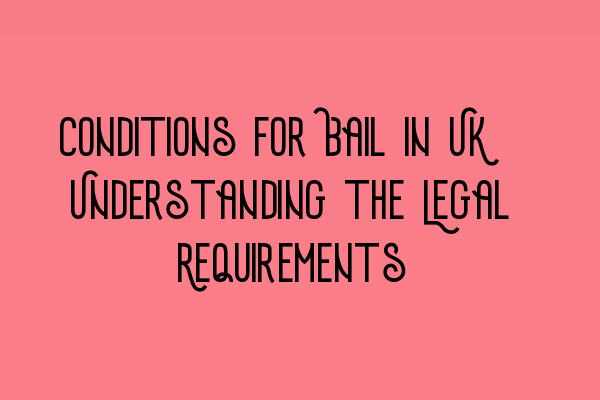Conditions for Bail in UK: Understanding the Legal Requirements
When it comes to criminal law in the UK, understanding the conditions for bail is crucial. Bail allows defendants to be released from custody while awaiting their trial, but there are specific legal requirements that must be met. In this article, we will dive into the conditions for bail in the UK and provide you with a comprehensive understanding of what is expected.
1. Understanding Bail
Bail is a legal process that allows individuals charged with a criminal offense to be released from custody until their trial. It is designed to strike a balance between protecting the public and ensuring that defendants are not unnecessarily detained. The decision to grant bail is ultimately made by the court, taking into consideration various factors.
In order to be granted bail, a defendant must demonstrate that they are not a flight risk and that they will comply with the conditions set by the court. These conditions are put in place to mitigate any potential risks, such as the defendant committing further offenses or interfering with witnesses.
2. Legal Requirements for Bail
There are several legal requirements that must be met in order for bail to be granted in the UK:
- 1. Flight Risk: The court will assess whether the defendant is likely to flee the country to avoid standing trial. Factors such as ties to the community, employment status, and family circumstances will be considered.
- 2. Offense Severity: The seriousness of the offense is an important factor. More severe offenses are less likely to result in bail being granted.
- 3. Risk of Reoffending: The court will consider whether releasing the defendant on bail poses a risk of them committing further offenses while awaiting trial.
- 4. Risk of Interference: If there is a concern that the defendant may try to interfere with witnesses or obstruct the course of justice, bail may be denied.
- 5. Vulnerability: The court will take into account any vulnerability or special circumstances of the defendant, such as age, physical or mental health issues, or a history of domestic abuse.
It is important to note that the decision to grant bail is at the discretion of the court. The court will weigh all relevant factors and determine whether the defendant can be safely released on bail.
3. Conditions of Bail
If bail is granted, the court will impose certain conditions that the defendant must adhere to. These conditions are put in place to ensure public safety and proper conduct during the period leading up to the trial. Common conditions of bail include:
- 1. Surrendering Travel Documents: The defendant may be required to surrender their passport or other travel documents to prevent them from leaving the country.
- 2. Curfew: A curfew may be imposed, restricting the defendant’s movements during specific hours of the day.
- 3. Regular Reporting: The defendant may be required to regularly report to a police station or other specified location.
- 4. Non-Contact Orders: The court may prohibit the defendant from contacting certain individuals, such as victims or witnesses involved in the case.
- 5. Surety: A surety (a financial guarantee) may be required to ensure that the defendant complies with the conditions of their bail.
Failure to comply with the conditions of bail can result in the revocation of bail and the defendant being remanded into custody until the trial takes place.
4. Seek Legal Representation
If you or someone you know is facing criminal charges and requires legal representation, it is important to consult with an experienced criminal defense solicitor. They can guide you through the bail process and help you understand the legal requirements specific to your case. Legal Representation for Delaware LLCs in the UK: Expert Advice
Legal challenges can be complex, especially when dealing with international matters. For UK businesses facing legal challenges in the U.S., it is essential to have a solid strategy in place. Legal Challenges for UK Businesses in the U.S.: Strategies for Overcoming Hurdles provides expert advice on how to navigate the legal landscape.
Preparing for the Solicitors Qualifying Exam (SQE) requires comprehensive study materials. SQE Exam Prep: Essential Study Materials for Aspiring Solicitors offers valuable resources to help you succeed in the exam and become a qualified solicitor in the UK.
Expert testimonies can play a significant role in building strong cases. Learn more about the importance of expert testimonies in UK courts in the article Expert Testimonies in UK Courts: Building Strong Cases.
Understanding the conditions for bail in the UK is crucial when navigating the criminal justice system. By complying with the legal requirements and seeking proper legal representation, individuals can increase their chances of being granted bail and ensuring a fair trial.
Disclaimer: This article is intended for informational purposes only and should not be construed as legal advice.
